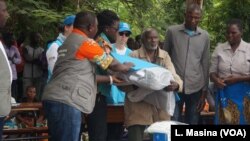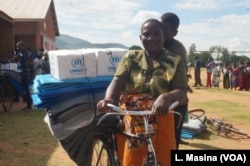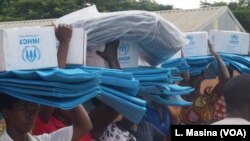The U.N. refugee agency, UNHCR, is helping thousands of people displaced by Cyclone Idai’s floods in Malawi return home and restart their lives.
In March, the cyclone, which also hit central Mozambique and Zimbabwe, forced nearly 100,000 people in southern Malawi from their homes.
Government officials want to close evacuation camps in May, but many residents say they still lack basic supplies needed to return home. This is where the UNHCR stepped in.
Ajaniya Kamenya is among the survivors of Cyclone Idai’s flooding, which killed over 70 people and affected nearly one million others in southern Malawi.
She vividly recalls March 8 when the storm hit. She says the house collapsed, and one wall fell on her son-in-law, almost killing him. They fled to an evacuation camp and took him to a hospital.
Kamenya lost all her property to flooding and endured tough conditions at Nkhulambe evacuation camp in Phalombe district, for nearly five weeks. She is now thinking of returning home with help from the United Nations refugee agency.
Kelvin Sentala, the Assistant Protection Officer for UNHCR, says hundreds of household are receiving assistance.
“For now we are distributing in three districts. In Nsanje we are targeting 1,000 households, In Chikwawa 500 households and in Phalombe here, 500 households. But I must also mention that we brought in 10,000 items, but we are also flying in another 20,000 items that will target 4,000 households in other districts,” Sentala said.
The UNHCR is distributing family tents, plastic mats, mosquito nets, sleeping mats, solar lamps and flashlights, blankets, kitchen utensils and other items.
Beneficiaries like Kamenya appreciate the help, but still struggle to feed their families.
She says her maize crop was washed away by floods. So she will have to work on other people’s farms to get food.
Harris Kachale, the Director of Disaster Response and Recovery in Malawi’s Department of Disaster Management, says the government will continue to distribute relief items to the floods survivors even after they return home.
“We will be supplying them [relief items] for three months. But we also have plans to provide them with seed and fertilizer so that they should grow crops. We know if they grow now, by the end of three months they will have something to rely on,” Kachale said.
Malawi’s Ministry of Agriculture Authorities said this week that 100,000 households whose crops were washed away like Kamenya’s will receive free maize seed, potato vines and ground nuts so they can grow food to eat.












